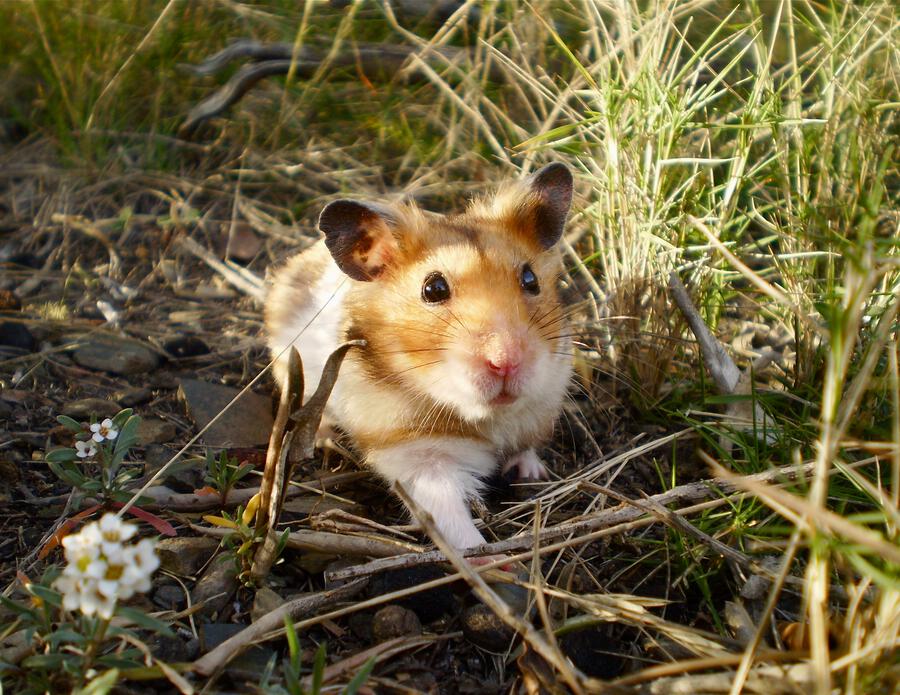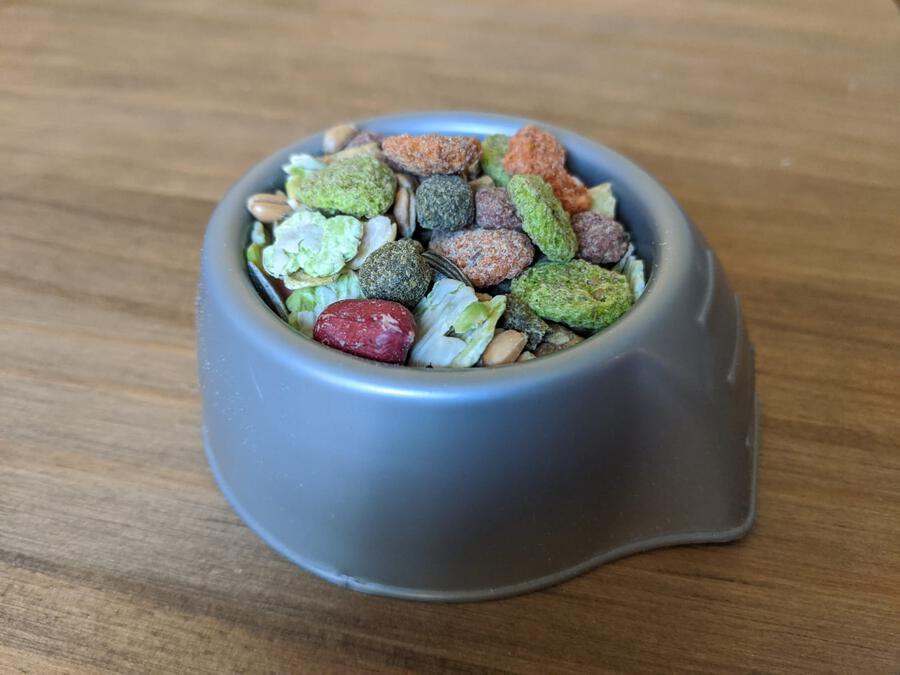If you’re thinking about getting a new hamster, you’re probably wondering which species of hamster lives the longest, because hamster’s on the whole, don’t live that long when you compare them to other pets like cats and dogs for example.
So, which hamster species lives the longest, the Syrian, the dwarf or the Chinese? Well, let’s find out shall we?
The European hamster, otherwise known as a Black-Bellied Hamster or Common Hamster, is known to live the longest with a lifespan in captivity of up to 8 years. However, the European Hamster is not kept as a pet. In terms of pet hamsters, the Roborovski Hamster is known to live the longest with a typical lifespan in captivity of between 19 and 40 months and an average lifespan of 26 months (source: Animal Diversity Web).
Why don’t hamsters live long?
Sadly, hamsters don’t live very long. You might get lucky and get a Roborovski Hamster that lives to be 3 years old, but most hamsters live between 1.5 and 2 years.
So why is it that?
Well, according to scientists, smaller animals tend not to live as long as larger animals, although there are of course some exceptions to this rule.
One theory is that hamster hearts beat faster and therefore live life at a fast pace which means their bodies get ‘worn out’ faster.
However, this theory doesn’t always apply, because bats and birds are small, yet they tend to outlive many larger creatures.
Another theory is that animals only live as long as they need to in order to reproduce.
With hamsters, there was an evolutionary pressure towards short reproductive cycles, mainly because they are highly predated animals (meaning they are the prey of other animals) and therefore only have a small amount of time before they reproduce.
New research now suggests that a total expended energy over a lifetime is an indicator for how long an animal might live.
How long do hamsters live in the wild?
It depends what species it is, but typically, hamsters don’t live quite as long in the wild, mainly because they are the prey for a lot of other animals out there.
But on average, in the wild, a Syrian hamster will live between 1.5 to 2 years whereas a Roborovski Hamster will live between 12 and 18 months.
Unfortunately, it’s not just the fact that they are prey animals, which affects their longevity in the wild. Hamsters are also extremely vulnerable to high temperatures, low temperatures and drafts.
So if it snows, hamsters will burrow underground, but not all of them make it in time.
It’s not all bad news for hamsters though. They have long teeth that grow continually and have pointed digits on their paws, both of which enable them to dig deep underground where they can live and nest, away from the dangers they face on the surface.
And when it comes to food, hamsters can carry a lot of it in their pouches and take it to their nest underground. This keeps them going during the day so that they don’t have to keep returning to the surface.
Typically hamsters will eat nuts, insects, fruit and even their own poop! (Yuck).

What is the longest living hamster?
According to the Guinness World Records, the oldest hamster ever lived to be 4.5 years old.
That’s an incredible age for a hamster considering most hamsters only live for a maximum of about 2 years.
So what is that in human years? Well, according to this study by the MAHSA University, Malaysia, one human year is equal to 13.67 hamster days over the entire lifespan.
So, 4.5 years is the equivalent of someone reaching the age of 120, which is amazing!
If you want to know how old your hamster is in human years, then check out the table below:
| Hamster Age | Age In Human Years |
|---|---|
| 1 month | 2.2 |
| 2 months | 4.5 |
| 4 months | 8.9 |
| 6 months | 13.4 |
| 8 months | 17.8 |
| 1 year | 26.7 |
| 1.5 years | 40.1 |
| 2 years | 53.4 |
| 2.5 years | 66.8 |
| 3 years | 80.1 |
How to make your hamster live longer?
There are certain things you can do to increase the chances of your hamster living longer, but like anything in life, there are no guarantees.
That being said, there are things you absolutely must do to make sure your hamster is leading a happy and healthy life and hopefully, if you get these things right, your hamster will go on to live longer too!
Diet
They say you are what you eat, and that’s true of hamsters too!
A healthy hamster is one that is fed a well-balanced diet and like us, they like to be fed a variety of foods, but they must be nutritionally balanced.
Although there are many types of food available, care must be taken such that the foods you choose to give to your hamster, when combined, form a nutritionally sound diet.
A hamsters diet should consist of staple food such as dried, pre-mixed food like this one on Amazon (#CommissionsEarned), but supplemented with fresh greens, fruit (not citrus fruit) and vegetables, high protein foods and milky or mashed foods.
Your hamster will appreciate these treats, but they should only be given in moderation.

Water
It goes without saying that hamsters, like anything, need water to survive and you should provide fresh water for your hamster either from the tap or a bottle every day (as opposed to sparkling or flavored water).
One thing to be aware of, is that hamsters can become dehydrated quickly if they are subjected to sudden heat or lack of water.
If you have a plastic or a glass-tank cage, then keep it out of direct sunlight as this will intensity the heat inside the cage.
Even if you have water available for your hamster in the cage, the heat may overcome your hamster before it can drink.
Another reason hamsters can become dehydrated is if the water bottle becomes blocked.
Every day, check that the water level has dropped. If your bottle doesn’t have any markings on it, consider drawing a line on the outside of the bottle with a marker pen, that way you’ll know there isn’t a problem with the bottle.
You can also check that the bottle is working properly by running your finger over the ball-bearing in the spout.
If your finger is wet after doing this, you know everything is fine. If it isn’t, it’s time to get a new water bottle.
In the meantime, you should provide a small bowl of water, so your hamster can have a drink, but this should be a temporary measure until you get a new bottle.
And finally, if you find that your hamster is drinking excessive amounts of water, it could be a sign of diabetes.
If this is the case, it’s best to take your hamster to the vet as soon as you can.

Exercise
We all know that a healthy diet helps us humans to live longer, healthier lives and hamsters are no different. However, exercise plays an equally important role and is especially vital for hamsters.
Hamsters love to run and will run for miles in the wild, so it’s important that your hamster can still run despite being in a cage.
If your hamster can’t get the exercise they need, then this can lead to obesity which can cause health problems for your hamster.
To enable your hamster to get a good workout you need a large enough cage, ladders and a wheel.
You also need to make sure that the wheel is large enough such that your hamster’s back isn’t arched when using it.
Cage Size
The size of your hamster’s cage is really important for your hamster’s health and general wellbeing.
The bigger your hamster’s cage, the better, because they need space in order to run around and get the exercise they need.
And if you think about it, in the wild, hamsters have free range over a large open area.
Studies have also been carried out, such as this one, which showed that hamsters kept in smaller cages had a higher body temperature which causes chronic stress.
The minimum size cage you should get varies depending on which country you live in, but you need to aim for a cage with a floor space of at least 450 square inches.
As a general rule of thumb though, go as large as you can afford.
Cage Temperature
In terms of temperature, the ideal temperature range for a hamster is 68-77F or 20-25C.
Although you shouldn’t put your hamster’s cage on the floor where it can be drafty, or near a window where it is likely to get direct sunlight, it is important to put your hamster’s cage in a room where there is a window and plenty of ventilation.
A good tip is to get a thermometer and keep it inside your hamster’s cage. Often the temperature in your hamster’s cage will be different to the room that your hamster cage is in.
Cage Cleanliness
It goes without saying that you should clean your hamsters cage on a regular basis.
We clean Richmond’s cage out once per week with hamster cage disinfectant and spot clean in between.
This helps to prevent your hamster from walking through their own droppings and picking up germs
Additional advice
Sometimes, you can do everything correctly and look after your hamster well and still your hamster may not live as long as you had hoped it would.
This is perhaps due to genetics.
Some hamsters may have inherited genes that enable them to live a long life, whilst others may have genes which mean they have a shorter life.
Unfortunately, this is beyond your control, but there are some additional things that you can do to help your hamster live longer in addition to the things that I have already mentioned like diet and exercise.
These are as follows:
- Keep your hamster away from scented products, cigarette smoke and bedding that contain phenols like pine and cedar. These things can severely affect your hamster’s lung function.
- Look for signs of illness. Hamsters are prone to things like colds and eye infections, so if you notice something not quite right with your hamster, be sure to get it checked out by your vet as soon as possible.
- Look after your hamster and keep it happy. A hamster that is happy, not stressed out or frightened and isn’t bored is probably going to live a longer and healthier life.
Wrapping Up
When you’re about to purchase a hamster, it’s good to do some research and so I hope this blog post will help you reach your decision.
But remember, although it’s good for you as a pet owner to have a hamster that lives for a long time, it’s more important for your pet that it has a good quality life.
But, if your hamster does have a good quality life and is looked after properly, then there is every chance your hamster will stick around for that bit longer!
